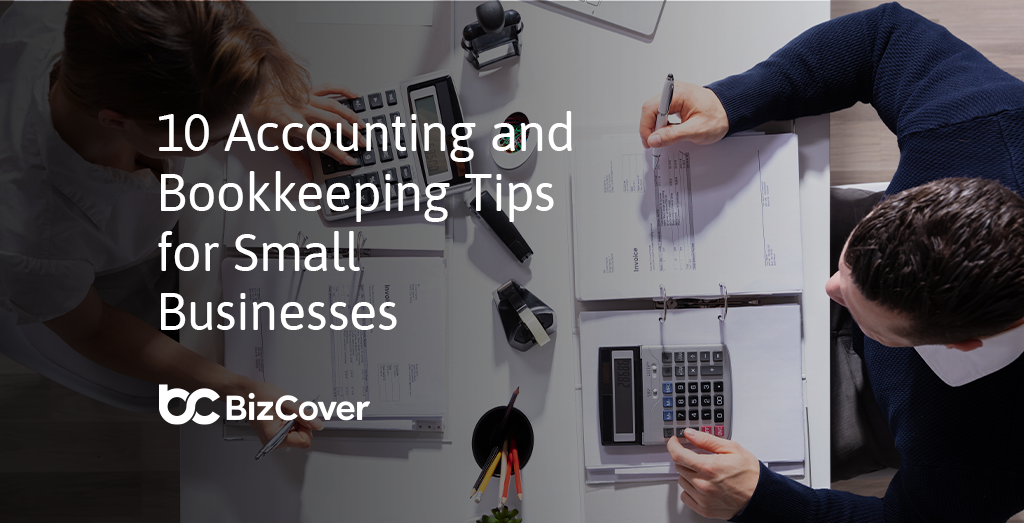10 accounting and bookkeeping tips for small businesses
Your business’s financial health is the backbone of your success, which is why having good accounting and bookkeeping practices is as essential as the products or services you offer your customers.

But don’t worry, it’s not as daunting as it sounds! In this article, we’re going to offer some accounting and bookkeeping tips for small business owners that will set you on the path to financial clarity and success.
1. Separating personal and business finances
Imagine trying to sift through a mixed bag of personal groceries and business supplies in your bank statement. It’d be a recipe for confusion.
To avoid this, open a dedicated business bank account as soon as your venture kicks off. The separation will save you the time-consuming task of filtering out personal transactions from business ones. Also, you’ll have a transparent view of your business cash flow, making it easier to manage budgets and find ways to improve your business finances.
Equally important is the discipline of not dipping into business funds for personal expenses. Use personal funds for personal needs and vice versa. Additionally, consider getting a business credit card. It not only helps in segregating expenses but can also come in handy for those business-specific purchases, building your business credit history along the way.
2. Choosing the right accounting structure
Small businesses typically have two primary choices when it comes to their accounting structures: cash-based and accrual-based accounting. Each has its advantages depending on your business’s nature and size.
Cash-based accounting is straightforward. You record transactions when cash changes hands. This method is ideal for small businesses or startups without significant inventory, as it’s simple to maintain and understand.
On the other hand, accrual-based accounting records income when it’s earned, and expenses when it’s incurred. This approach doesn’t take into account when the cash is actually exchanged. Accrual-based accounting suits larger businesses or those with more complex operations, as it offers a more accurate long-term picture of the business’s finances. Whichever structure you choose, ensure it aligns with your business’s size, goals, and style of operating.
3. Maintaining organised records
When you’re a business owner, time is a precious commodity. One way to save it when doing your business bookkeeping is by keeping your financial records organised and easily accessible. This approach means you can quickly locate what you need, whether it’s for an unexpected tax audit or just a routine financial review.
To keep your records in shipshape, start with a filing system that works for you. It could be digital, physical, or a blend of both. Key documents like invoices, receipts, and bank statements should have their dedicated space, and it’s crucial to update this system regularly. A little effort in maintaining this order each week can save hours of frantic searching later.
4. Creating and managing a budget
Creating a budget involves planning for future expenses, setting aside resources for growth, and preparing for unexpected costs. Creating and sticking to a budget is not only good small business accounting practice, it also paves the way for growth and stability.
But a budget is not a set-and-forget affair. Regularly monitoring and reviewing your budget is crucial. By regularly reviewing your budget, you stay informed about your cash flow, can swiftly identify and rectify any financial discrepancies, and make informed decisions that align with your business objectives.
5. Budgeting for taxes
Being a business owner means taking on the responsibility of tax planning. It’s crucial to remember that a portion of your income is earmarked for taxes. However, it doesn’t have to be a source of stress.
Consider implementing a system where a fixed percentage of each sale or income goes directly into a tax savings account. This approach turns a potentially overwhelming lump sum into manageable, bite-sized savings.
This way, you’re not caught off guard when tax payments are due. Plus, it instils discipline in financial planning, keeping your business on track and the taxman happy.
6. Respecting tax deadlines
Tax deadlines are like silent alarms. They sneak up on you before you realise it, and then demand your full attention. Missing them can have repercussions ranging from penalties to unwanted scrutiny from tax authorities. But with a bit of planning, you can turn this challenge into a manageable part of your small business accounting and bookkeeping.
To stay ahead, mark your calendar with all tax deadlines as soon as you’re aware of them. Setting reminders a few weeks in advance can provide enough buffer to prepare and review your tax documents thoroughly. This proactive approach not only keeps you compliant but also grants you peace of mind.
Also, allocate specific times each week to review and organise your financial records. This regular practice can make tax preparation less overwhelming and more manageable.
7. Good receipt management
Another accounting tip for small business owners is to keep track of your receipts. It’s all about keeping a trail of breadcrumbs that lead back to your business expenses.
The first step is to collect every receipt related to your business transactions. Yes, every single one – from that packet of pens to the new laptop. Next, create a filing system. This could be a physical folder for paper receipts or a digital app for electronic ones. After that, set regular intervals, either weekly or monthly, to organise these receipts.
8. Creating profit and loss statements
Think of a P&L statement as a health report card for your small business accounting and bookkeeping. It gives you a look into your financial standing by laying out your revenues, costs, and expenses over a specific period.
To compile one, start by gathering all your financial records – sales, returns, operating costs, and any other expenses. Then, break down these numbers monthly or quarterly to track your business’s progress.
Are some months more profitable? Where can costs be cut without impacting quality or growth? By regularly reviewing your P&L statements, you have a better understanding into spending trends, efficiency of operations, and profitability.
9. Automate your accounting
Imagine if you could minimise the time spent on mundane accounting tasks and redirect that energy towards growing your business. That’s the power of automation.
Automated accounting software can handle repetitive tasks like tracking expenses, generating invoices, and managing payroll with ease. This not only frees up valuable time but also reduces the risk of human error, ensuring your financial records are precise and reliable. Moreover, with real-time data processing, you get instant access to your financial status, helping you make informed decisions swiftly.
In other words, automating your accounting processes is like having a silent, efficient assistant who works 24/7, allowing you to focus on high-level business tasks.
10. Using accounting software
Gone are the days of sifting through piles of paperwork or struggling with complicated spreadsheets. With the right accounting software, even those who aren’t tech wizards can manage and improve their business finances like a pro. It can simplify tasks from tracking expenses to creating invoices.
The real beauty of accounting software for small businesses lies in its ability to give you a clear financial picture at any moment. This level of clarity and convenience not only saves time but also empowers better decision-making, improving your business finances and keeping your business agile.
Keep your books balanced and business booming
Just like a well-oiled machine, your business cannot run smoothly without clean books. By following these small business accounting and bookkeeping tips, you can keep your books in check while also paving the way for sustainable growth and success.
Just like properly managing your accounts, ensuring your business is adequately insured is a key step towards long-term success. With BizCover, you can compare and choose from multiple insurance quotes, all online and with zero paperwork. Over 220,000 small businesses trust us for affordable, drama-free insurance solutions.
Start protecting your business today with BizCover.
This information is general only and does not take into account your objectives, financial situation or needs. It should not be relied upon as advice. As with any insurance, cover will be subject to the terms, conditions and exclusions contained in the policy wording. © 2025 BizCover Limited.





